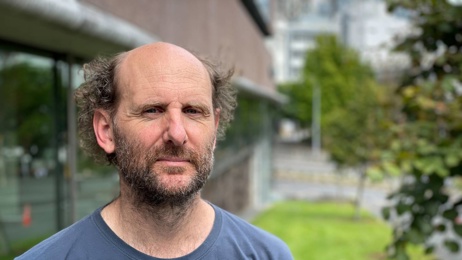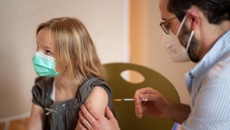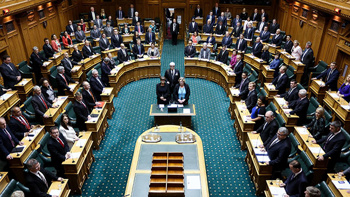COVID LATEST:
* Auckland moves to alert level 3 from 11.59pm tonight.
* The 90% Project: Behaviour change experts pick 21 things politicians and business can do to help NZ get vaccinated
* MIQ squeeze: Why are 18,500 hotel rooms going unused, expert asks
* Thomas Coughlan: Ardern's elimination gamble - is it the most consequential of the pandemic?
* Barry Soper: Don't expect Govt to admit ditching its elimination plan
* Delta Diary: Kim Knight on Week 5 and the return to alert level latte
Auckland could remain in alert level 3 for months as it wrestles with the deadly Delta variant following the Government decision to move the city out of level 4 lockdown, an expert warns.
But Prime Minister Jacinda Ardern says we can still eliminate the virus under level 3 so long as people stick to their bubbles, despite cases numbers remaining stubbornly high.
"Caution," Ardern said was the key word as she announced Auckland would move to alert level 3 for at least two weeks from midnight on Tuesday.
Director general of health Dr Ashley Bloomfield told director general of health told Newstalk ZB's Mike Hosking that it would have been nice for the case numbers to be lower, but they were all connected to current cases or were in managed isolation, so they were comfortable announcing the alert level change for Auckland.
Despite that, he said of the alert level change: "You lose a bit of sleep over them."
He said one of the households affected lived on the same street as another household now infected with Covid-19.
Experts are split on the move, with most agreeing the city is on a "knife edge" in terms of eliminating the virus or alternatively seeing cases shoot up again.
Monday's alert level decision has been regarded as the Government's toughest of the pandemic.
It had to balance high daily case numbers - 22 on Monday - in Auckland despite it being in the longest lockdown yet, with an increasingly restless population and business community.
There have also been strong calls, including from the Māori Pandemic Group, to hold off lowering alert levels until vaccination rates were higher in vulnerable groups.
Level 3 move a political decision: Expert
Auckland Professor Des Gorman told Newstalk ZB's Mike Hosking that he believed the Government's decision to move Auckland out of level 4 was a political decision more than a health decision.
Gorman said the way the pandemic had been managed was through fear.
"Our attitude to Covid is completely out of whack," he said, compared to any other health condition.
He acknowledged that we were dealing with Delta - a highly contagious variant.
But he said the way authorities had managed this latest outbreak was somewhat slack - pinpointing that the contact-tracing system, for example, was determined by people's honesty and memory.
"Obviously the Government's decided that public opinion is shifting and they needed to get in front of it to be seen to be leading that opinion, rather than being driven by that opinion," Gorman said.
"My view is that it's been politicised from the get-go and that health has had some input, but that ultimately the decisions have been political - and that's been true around the world."
Gorman said in New Zealand's situation we had seen a shift - from a zero tolerance for cases, to a zero tolerance for deaths.
"And I think that's going to shift even further still."
Gorman said we - and the world - now had a mortal fear of Covid and dying from Covid.
But there were many other health conditions, delayed cancer treatments, surgeries and mental health issues that were not being seen to as a result.
Gorman said the vaccination rate needed to reach higher than 80 per cent for life to go back to normal.
But he estimated that before the vaccination rate reached up to 80 to 90 per cent, the public would get restless and would no longer have an appetite for hard lockdowns.
A calculated risk
Professor Michael Plank said moving to level 3 was a calculated risk by the Government but it was really important people didn't take it as a signal that virus has passed.
The way the virus spread through the community was people having contact with their family and friends.
Plank told TVNZ it was really hard to ring-fence the virus and stop it jumping into a new household and spreading within that household.
Plank said moving North Waikato into bespoke level 4 was buying time to find out the extent of the spread and did not rule out the border being further extended.
In level 2, the virus could spread more quickly and could transmit through schools and other parents and teachers who may have been out and about in the community and travelling around the region, he told TVNZ.
Auckland Business Chamber CEO Michael Barnett says many businesses were currently drowning in debt and would be extremely relieved to move back to level 3 from midnight.
However many won't be operating anywhere near 100 per cent. They will have to be innovative, Barnett said.
Some businesses will have supply chain constraints, and the Government should provide a flexible environment in level 3. He said the thought of moving in and out of alert levels will also be disruptive if that happens. He thinks half of Auckland's businesses will operate at about 50 per cent in level 3.
The business chamber surveyed Auckland businesses and found 86 per cent said their wellbeing was below 5 out of 10, he told The AM Show.
Regarding the Prime Minister's directive that over-65s who have not been vaccinated should stay at home - Barnett said there would be a huge conversation with employers about jabs and jobs, as was happening elsewhere in the world.
Level 3 will see some freedoms return, including contactless takeaways and deliveries, businesses able if they can do so safely, increased outdoor activities and some students returning to schools.
However Ardern, accompanied by Bloomfield, made it very clear it was only a slight adjustment to current settings.
"Level 3 is not open up," Ardern said.
"Level 3 is still stamp it out."
While daily case numbers had been hovering around 20 for the past week, Ardern said level 4 had "done what it was designed to do" and created a ring-fence around the outbreak, suppressing the number of unlinked cases.
There was "strong confidence" they were contained and there was no widespread community transmission, Bloomfield said.'
/cloudfront-ap-southeast-2.images.arcpublishing.com/nzme/BK7VBU4VKQDTR24OLAZAQ62GJQ.jpg)
Prime Minister Jacinda Ardern said the key word for level 3 was "caution". Photo / Pool
This was despite three new cases announced on Sunday night in the small settlement of Whakatīwai south of the lockdown boundary, linked to a prisoner who had left Auckland while on remand.
Also supporting the move were increasing vaccination levels, with Auckland approaching 80 per cent of its eligible population having had their first dose, Bloomfield said.
The city was on track to surpass 90 per cent by mid-October, he said.
These reasons were why he was confident Auckland would not need to return to level 4, even if case numbers rose again.
Looking further out Ardern said "90 per cent plus" would help lower alert levels further.
"That's the range we want to see people aspiring to. That's the level where we might have fewer restrictions."
Covid had been eliminated at level 3 before, and the Government was confident it would happen again, Ardern said.
In August last year Auckland spent just over two weeks at level 3 to contain an outbreak that grew to 131 cases over that time.
However, epidemiologist Dr Michael Baker said it was much more difficult to do so with the highly infectious Delta variant.
At level 3 Baker said stamping out the virus would be much more difficult, and there was a risk the country would move into "suppression mode" as in New South Wales, remaining at level 3 settings for months.
"It is possible to eliminate under level 3 settings, and we do have rising vaccine coverage.
"There is a lot of data not released so for all we know the virus might have stopped transmitting and we are just seeing the end of it.
"The main thing now is for contact tracers to really get on top of it and go after those last chains."
Te Pūnaha Matatini Covid-19 modeller Professor Michael Plank said it was a calculated risk moving Auckland to alert level 3 and there was a very real chance of returning to level 4 within weeks.
"It relies to a large extent on people doing the right thing now."
Plank said people meeting up with friends and family members not in their bubble was the biggest risk.
University of Auckland's School of Population Health Professor Rod Jackson said it was a "sensible" decision.
Jackson said level 3 was basically level 4 but with takeout.
"When you leave home you should treat everyone was if they have Covid and as if you have Covid."
He said everything New Zealand was going to do between now and Christmas was "stop gap measures" until enough of the population was vaccinated.
Jackson said he didn't think any of the country should move down to alert level 1 until enough people were vaccinated.
Covid modeller Professor Shaun Hendy said it was a risky decision with the outbreak "not completely under control" - as evidenced by the prisoner case.
"It is too hard to call [if there will be a rise in cases], we really are on a knife-edge."
While New South Wales had seen a rise in cases at similar level 3 settings, Hendy said our cases were at a lower starting point and contact tracers could still get on top of them.
Earlier, Māori Pandemic Group spokeswoman Professor Sue Crengle called for an extension to level 4 and expansion into Waikato, and level 3 for much of the upper North Island due to cases creeping outside Tāmaki Makaurau.
The group's concern was for vulnerable communities with still low vaccination rates and a risk the cases could signal a wider outbreak.
Ardern said they were confident the cases were contained, and they had instituted a "bespoke" level 4 border for the affected area.
Auckland Mayor Phil Goff welcomed the decision but urged Aucklanders to follow the rules and get vaccinated.
"Following the guidelines, as well as getting vaccinated in large numbers, has helped reduce transmission and enabled us to move down alert levels.
"Moving further down the alert levels depends on us keeping up this effort."
Alongside the move to level 3, the rest of the country would shift from Delta 2 to normal level 2 settings, which included increasing gathering sizes from 50 to 100.
Take your Radio, Podcasts and Music with you









